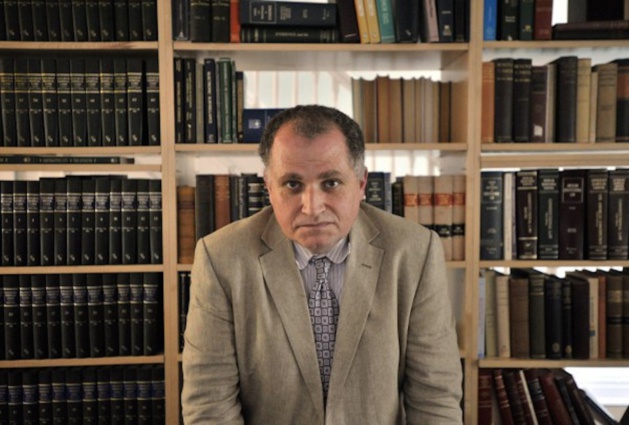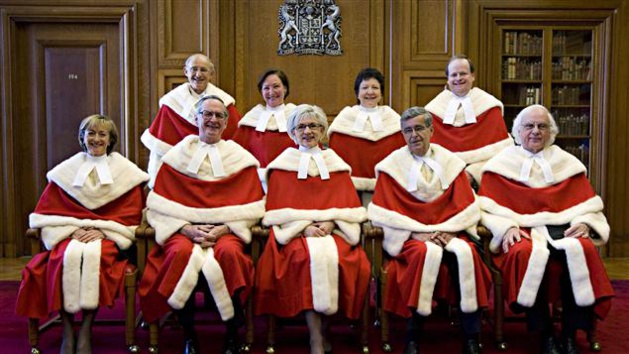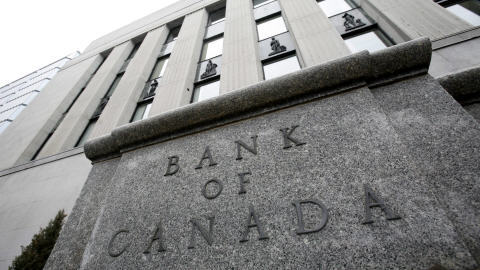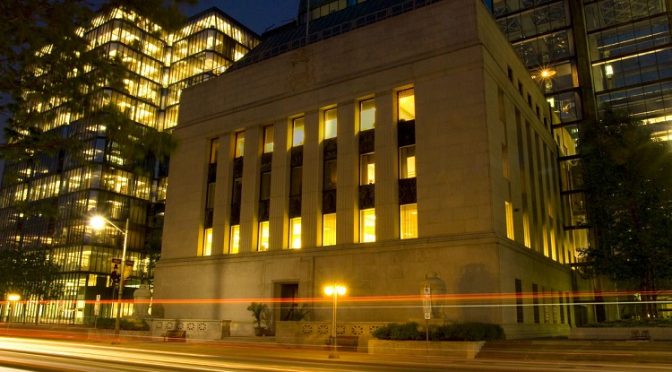“Money is not wealth; politics and economics are two sides of the same coin, and it is the full understanding of political economics that is the true final frontier.”
The battle between fiat bankers and constitutional experts is still ongoing and the current Trudeau administration has not made up its mind just yet whether to return to constitutional banking system, or not.
Remember this Trudeau backgrounder as you watch the last videos in this article.
Here’s the long story…
COMER vs. Bank of Canada
In early August 2013, two Canadians and COMER “confronted the global financial powers in the Canadian federal court.” They have filed a case against Bank of Canada earlier in 2011, in an effort to return the central bank to the people of Canada by printing its own debt-free currency like it was before 1974.
“COMER contends the Bank of Canada, a publicly owned national financial institution created in the Great Depression, is mandated to provide debt-free support for public projects undertaken by federal, provincial and city governments. Not doing so has deprived Canadians of the benefits of larger infrastructure investments, COMER alleges.
Among other arguments in its court submission, the group alleges Canada ceded its sovereign ability to conduct independent monetary policy to the “secret” deliberations and control of private foreign bankers. This unconstitutional move, COMER argues, was a result of Ottawa’s decision to join several multinational financial organizations, particularly the Bank for International Settlements (BIS).
Headquartered in Switzerland, the BIS is an organization that brings together the central banks from 60 countries to co-operate in the promotion of international monetary and financial stability. Canada joined in 1970.
“It’s by far the most serious and important case I’ve ever done,” said Galati, who gained national prominence in a classic David versus Goliath case last year in which he moved to block Prime Minister Stephen Harper’s appointment of Justice Marc Nadon to Canada’s top bench.
Of the current case, Galati says, “It impacts the entire country in a profound way, right down to the bone of our economics and the history of the way we’ve maintained and lost, through illegal action, our independent monetary policy. It’s huge.””
http://www.thestar.com/news/canada/2015/03/23/rocco-galati-in-court-to-challenge-how-bank-of-canada-does-business.html
If you are interested to know the inside story about this case, the ugly truth about banking and high treason in governments from a constitutional expert, you need to watch this video in full…
- Constitutional lawyer Rocco Galati to challenge Bill C-51 in court. Video
- Rocco Galati interviewed by Amanda Lang on CBC News.
The Bank of Canada against Rocco Galati, a historic lawsuit
Laurine Benjebria, translated by Darragh Hayes-Moriarty, 13 Octobre 2015
On behalf of the collective COMER, constitutional lawyer Rocco Galati initiated a lawsuit against the Bank of Canada in 2011. This historic legal action builds on constitutional issues: Rocco Galati and COMER accuse the Canadian central bank of borrowing from private banks and not to resorting to loans at low interest rates. The lawsuit filed against the Bank of Canada accuses the bank of diverting from its primary objective and harming Canadian citizens. There has been feedback on a historic battle passed over by the main Quebec media.

Credit Rocco Galati, J.P. Moczulski-For Postmedia News
It was in 1938 that the Bank of Canada was nationalized, adopting as a priority the principle that each of its loans serves the public good. According to the Banking Act and the Canadian Constitution, the Bank of Canada may authorize loans to federal and provincial governments so that they do not need to resort to intermediaries such as private banks. The loans granted to provincial and federal governments can represent up to one third of their annual budget, as long as the loan is paid the following year. Each year, the Parliament can exercise its power – to impose taxes for example, without having to explain to the House of Commons how its plans to spend its budget. So it is through a constitutionally required process that the government budget is assigned. This borrowing process among other things allowed Canada to fund the construction of the Trans-Canada Highway, the work of the Seaway St. Lawrence and the construction of universities in the 60s and 70s.
When asked by Le Journal International on June 29, Jean-Pierre Gueyie, a professor at the School of Management Science (ESG UQAM) said that the role of the Bank of Canada “is to in some way regulate the economy and, from this point of view, its policy is to be a lender of last resort. That is to say, when financial institutions have difficulties, they may resort to the Bank of Canada for funding. The institution lends money to banks that have liquidity problems and may not necessarily resort to the interbank market.” From 1974, loans with low Canadian Bank’s interest rate for government projects declined. For Rocco Galati and COMER Committee (Committee on Monetary and Economic Reform), this can be explained largely by Canada’s membership in the Bank for International Settlements (BIS), making the Bank of Canada the only public bank in the G20 to be a member of the BIS.
“When Canada joined the Bank for International Settlements (which is like a central bank for banks), the Bank of Canada was forced to align with the BIS policy of loans with interest. The Bank for International Settlements tries to put in place mechanisms to ensure that the OECD countries are not found in systemic issues. We will try to coordinate policies to avoid problems in the financial system, and if these problems exist, try to avoid them becoming systemic as happened in the 2008 financial crisis,” Jean-Pierre Gueyie told us in June 2015. It is this same alignment that Rocco Galati and member of the COMER committee criticize, accusing the Bank of Canada of not acting in the interest of the public good but that of international private banks. At a lecture given April 28, 2015 at the University of Quebec in Montreal, Ann Emmett, President and co-founder of COMER lamented that “today, nearly 97% of our money is created by banks private. They have the profit, we have debt that is there to justify the agenda of neo-liberal policies. When the system fails, we are the ones who get them out of trouble.”
A lawsuit on constitutional grounds
Based in Ontario, the collective COMER is a research group studying the Canadian currency reforms. According to committee members, the current economic system and monetary policies are the main causes of financial instability in recent decades. The group has focused for some years on the borrowing process of the Bank of Canada, including seeking to understand how Canadian Bank changed its policy on borrowing at low interest rates. The Committee advocates a mixed economy, notably through a return to the original missions dictated by the Bank of Canada Act law. Adopted in 1938, this federal legislation allowed the creation of the Bank of Canada, in the heart of the current Canadian banking system. Since 2011, with the participation of Canadian Lawyer Rocco Galati, the committee has hounded the Bank of Canada through the Supreme Court.

Credit: PC/Adrien Wyld
The constitutional lawyer, who objected to the appointment of Justice Marc Nadon to the Supreme Court by Stephen Harper and the Bill C-51 extending the mandate of the Canadian Security Intelligence Service, said during the conference COMER April 28, 2015 at UQAM that “”Not only has the government abandoned its constitutional duty to govern, but it has transferred it to international private banks which corresponds to an abandonment of its sovereignty.” The purpose of this legal action is to return to the primary mission of the Bank of Canada, being able to provide loans at low interest rates to the Canadian government. But for any State, the right to borrow interest-free or at very low levels, is a right to issue its currency without private intermediary. It is therefore, with this case, a legal battle of major importance for both the federal and provincial governments and for the Canadian taxpayer. Even before the collective and Rocco Galati are heard by the Supreme Court of Canada, the Canadian government made a motion to strike out the statement by Rocco Galati, a request accepted by the Court.
In other words, the Canadian government argued that the Supreme Court did not have the right nor the expertise nor the means to listen to the cause of the Ontario research group. After appealing, Rocco Galati managed to have his case heard before the Supreme Court of Canada. On January 26, 2015, the judges of the Supreme Court have argued in favour of the plaintiffs, the COMER and Rocco Galati, forcing even the Canadian government to provide substantial evidence on the subject. While the prosecution by Rocco Galati and COMER at first demanded a dollar per Canadian citizen, as a class action, the Court subsequently suggested to the constitutional lawyer to abandon this part of the trial in order to focus solely on constitutional matters, including issues of compliance of the budget process. On May 13, 2015, the Canadian government told the committee that it would appeal against the decision of the Court. Rocco Galati once again won his case in this long legal battle that is just beginning.
An overhaul of the financial system in Canada
By filing a complaint against the Ministry of Finance, the Ministry of National Revenue, the Attorney General of Canada and the Bank of Canada, the COMER committee is seeking a declaration from them stating that they have failed in their statutory and constitutional mission. This legal battle led by the Ontario lawyer Rocco Galati may lead to a major impact on the Canadian and provincial financial system. Mr. Galati and COMER research group want the Bank of Canada, which belongs to every Canadian taxpayer, to lend to the Canadian government with lower interest rates for the public good, under democratic control of the borrowing priorities. According to Rocco Galati, the policy change by the Bank of Canada participated in the debt of Canada, costing nearly a billion dollars in interest on the national debt in 2012.
For Professor Jean-Pierre Gueyie, the action brought by the COMER may, however, have adverse effects on economic activity: “This lawsuit could cause a minor error in the current system. As the system currently works, when the government wants to carry out work for example, it is financed by paying interest on the cost of financing. And it allows households, banks and the institutions to seek money and pay interest through this very mechanism. If the Bank of Canada funds the government without interest, we take away from all this wealth creation. As this wealth is for all Canadians, this would amount to a sleepless game. There would be revenue of the financial system that would be lost.” The consequences of this overhaul of the governments of the funding mechanism remains a debate within the community. And on January 26, 2015, the three judges of the Supreme Court of Canada ruled in favour of Rocco Galati and COMER. The Supreme Court thus affirms that the Bank of Canada must be able to issue interest-free money for the needs of provincial and federal governments.
A lack of attention from major Quebec media

Credit RR
Very few Quebec media were interested in this lawsuit that could well upset the Canadian financial system. While the HuffingtonPost Québec and the independent news website 99% Media have published a few articles on the subject in recent years, Canada’s major media outlets such as Radio-Canada and La Presse have not published any article on the subject since 2011 . In a review of the Ombudsman of the CBC released on August 4, 2015, Pierre Tourangeau responds to complaints from some readers about the lack of media coverage of the trial of Mr. Rocco Galati. The ombudsman explains why: “Journalists and editorial managers of ICI CBC felt that the subject, among all the subject which they have to choose from every day, did not have enough public interest to talk about it “. Pierre Tourangeau highlights the length of the legal process and the numerous appeals made by the two parties that reveal whether a trial would indeed take place. The Ombudsman of the CBC French service also emphasizes that “the actions of COMER and Mr. Galati itself are “frivolous” according to some constitutionalists, not founded in law for others.”
In the rest of Canada, CBC and Toronto Star have, a few times, informed Canadians about the status of the trial. This legal battle nevertheless represents a major change in the financial policy and the Canadian financial system. The lack of information about the trial, as well as about the research of COMER, contributes to people underestimating the scope of such legal action. In the review of COMER Committee for editing from May to June, Ann Emmett reports that renewed media attention was not seen until spring 2015, as a result of the decision of the judges of the Supreme Court: “at last, the mainstream media has begun to report on the issue”
http://www.lejournalinternational.fr/The-Bank-of-Canada-against-Rocco-Galati-a-historic-lawsuit_a3314.html
So far, the entire Corporatocracy is playing the usual “good cop, bad cop” script to delay and dampen the resolve of the plaintiffs.
And now Canada has Justin Trudeau at the helm, but is he really the real deal?
https://www.youtube.com/watch?v=F60eZhFuLRY
The video below has been “privatized”, but you can still download it from this link.
Why would he try to correct the mistakes of the past, when it was exactly his own father, Bilderberger Joseph Philippe Pierre Yves Elliott Trudeau, who stopped debt-free money printing in favor of private banking money causing debt to rise rapidly from $18 Billion to $1.2+ Trillion today, against the total GDP of $1.8 Trillion only.

Here’s a very clear historical background of what had actually happened with Bank of Canada and its profound impact on the Canadian economy.



Like all other Nations we got to trust and I will emphasize the word TRUST. From Elliot Trudeau, Brian Mulroney and the Stephen Harper bank account profitter’s, you need not search very far on why they all sat quietly and never stood up to the change in the banking rules. From private Swiss Bank accounts to politicians them selves getting government loans to profit their on businesses. You need not dig deep to find this information. I can’t comment on Justin Trudeau at this moment because he as just been elected and it’ld be to quick to judge if I did. Will take a step on the limb and wait to see if he walks his talk and brings TRUST back to Canadians.
Justin Trudeau is not NEW anymore; he has been in office a long time – too long for my blood.s I think It is safe to assume that his primary interest regarding our Nationalized Bank of Canada is non-existent. He walks in the steps of his Father, Bilderberger, Pierre E. Trudeau. He want Canadian Government – Federal, Provincial and Municipal – to have to borrow money from PRIVATE FINANCIAL INSTITUTIONS. This is politically ludicrous; this is what maintains our level of debt. The PRIVATE BANKS show a profit every year, riding on the backs of the Canadian Taxpayers and the interest that our taxpayers pay on an ever-rising debt. This is not only Unconstitutional; it is against our own Banking Act of 1938A. Canadians must come to understand this; placid Canadians that we our, we must raise our fists, take out our signs, and start yelling: “Reinstate our Nationalized Bank of Canada”. We must realize that the current illegal system feeds the PRIVATE BANKS via the Bank of International Settlements. Canada has surrendered it economic sovereignty to private FINANCIAL INSTITUTIONS. We must get this stopped; we m ust reclaim our economic soverignty!
Eliminate human control of money and money creation. Transition to Bitcoin. Bitcoin is the foundation and if a nation wants its own crypto it can price it relative to Bitcoin like altcoins do currently.
Use “national security” assets to protect and secure food, energy, and the Bitcoin infrastructure instead of senseless wars and murdering innocent humans.
As or the Bank of Canada please wake up and smell the icing that covers that rotten apple. Most Profits are there to up the bank account of what they call the Queen of England, to see tax payers monies dish out millions and millions for a 2 day visit to Canada, to even taxes to pay for some of the up keep on their castle, while we have a failing welfare system,families barely making ends meat. Lets get to the real point of the interest rates to the working class businesses that file bankruptcy because of taxes. From paying Employment Insurance Tax,Canada Pension Tax, Income Tax and that is only the start. God forbid if you the owner takes a salary because then the whole process starts over,the owner of the business that takes a salary becomes a worker and on that salary pays Employment Insurance Tax,Canada Pension Tax, Income Tax and at the end of the year comes Income Tax Filling,well long and behold if you don’t realize, you’ld be richer a poor man on welfare. Then to help the hard working, we go to property tax, if you buy a car pay Tax, Registry Tax, if it’s a second hand car that tax as already been paid for, you pay tax again on that car and then transfer fees with tax, food tax, electricity tax.I need not go on. I’m sure you got the point. Call ourselves slaves to the rich and their mafia.
Nobody and thats including governments should have monopoly powers in the issuance of money. Free market banking and money is the only solution. At the very least they should be a separation of finance state like that of church in state, they dont belong together. Fredrich Hayek’s free-market in money and banking, open entry financial system like that of BITCOIN or goldmoney is the only solution that is beneficial for all. Money should not ever come from the top down , whether by governments or private banks. Money is best when it is organic and subjected/restrained to the whims, sentiments, competition and necessary creative destruction of free open markets. Money should and is always best when done from grassroots bottom up approach.
DIMITRI, you seem to miss the point and the existing law 1
I think it’s possible to persuade Justin Trudeau to change his view on this, but it has to be done without embarrassing him personally – when Justin himself had no part in making that unfortunate decision in 1974. I’ve done my research, so I think I know how.
I don’t believe he’ll do it. He’s a globalist just like his father was.
COMER has lost for the fourth time. http://www.canlii.org/en/ca/fct/doc/2016/2016fc147/2016fc147.html?autocompleteStr=Committee%20for%20monetary&autocompletePos=2
In the words of the judge “their response convinces me that, for reasons given, they have no scintilla of a cause of action that this Court can or should hear. “
how come you have taken the Video down of Justin Trudeau down where he says he I follow what Mark Carney tells me to do!” and then shows Mark Carney works for Goldman Sachs… Whys does this now say “Private Video” what happened to the truth and free speech? How can we access this video??? Thanks! Did anyone copy this video??/
If so we would really like a copy of it.. jo*************@gm***.com
Please don’t hide the truth about Trudeau junior!!!
It came from his own mouth!
The Trudeau video above has been “privatized” by its owner, but you can still download it from this link.
http://www.getlinkyoutube.com/watch?v=hTUyIDRIAXo
Thanks! Great job folks! Semper Fi… John.
Sent from my iPhone
>
I guess Justin Trudeau is no different, why would they create an new bank for infrastructure funding? (an other private bank) why not just use our Bank of Canada?
Most economists, including those at the Bank of Canada, believe that increased Bank of Canada lending would be inflationary.
@John Munroe
Is it your statement that…
If the government borrows 100 billion dollars and spends it into circulation, that IS NOT inflationary
but
If the government creates 100 billion dollars and spends it into circulation, that IS inflationary.
It appears to me that they are both equally inflationary, and one has compound interest attached.
As was pointed out in the 1993 Report of the Auditor General of Canada (http://www.oag-bvg.gc.ca/inter…, chapter 5
{ *Note* Keep in mind that total federal debt in 1974 was $18 billion, which would mean that the shortfall from ’74 till 91-92 would have been $19 billion. }
“5.41 The cost of borrowing is the third area that affects the annual deficit. In 1991-92, the interest on the debt was $41 billion. This cost of borrowing and its compounding effect have a significant impact on Canada’s annual deficits. From Confederation up to 1991-92, the federal government accumulated a net debt of $423 billion. Of this, $37 billion represents the accumulated shortfall in meeting the cost of government programs since Confederation. The remainder, $386 billion, represents the amount the government has borrowed to service the debt created by previous annual shortfalls.”
Over 10 times the shortfall is required to pay back the interest and ‘interest on interest’ on these loans, when the BoC could have created the credit at no interest. They didn’t.
Why not?
Saanichtonian: First, it is impossible for the government to create 100 billion dollars without borrowing it. The creation money involves the creation of an asset and a liability at the same time. The Bank of Canada can get money to lend to the government in three ways:
1) Print and release currency to the public. If the Bank of Canada does this, there is no interest, but it still owes the money. Currency outstanding still shows up as a debt on the Bank of Canada’s balance sheet. This is inflationary because the holders of the currency have no reason to want to hold them. They will try to spend or invest surplus currency.
2) Borrow at interest. This is not free, but it is not inflationary. The holders of the debt will not try to spend or invest it, on balance, because it is earning interest for them.
3) Require the banks to lend interest free to them. The Bank of Canada did this until the 1990s. This would not be inflationary. The holders of the debt will not try to spend or invest it because they are not allowed to.
The Minister of Finance, the Bank of Canada, and most economists agree that the Bank of Canada creating money by printing currency would be inflationary.
A trillion and half in interest payments covers a lot of inflation.
COMER has now lost five times in court. The media is ignoring this case because it is not newsworthy when a small fringe group sues the government and loses.
Mainstream Media ignores this because they’re in on the globalist agenda.
So now what?
The Supreme Court of Canada just refused to hear COMER’s appeal of their appeal court loss, so the lawsuit is over.
The Supreme Court of Canada refused to make a judgement because it stated that the matter of Canada’ Nationalized bank was not a matter of law. THe laws were already in existence. So for the court to go further, it would need involvement of the country’s political will. In other words, the Nationalized Bank could be reinstated if an authorized person(s) from the country under concern asked for the Nationalized Bank to be reinstated and took step(s) to enact.